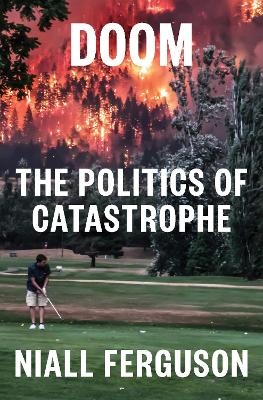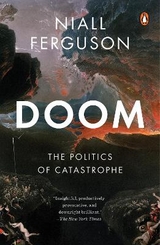
Doom
The Penguin Press (Verlag)
978-0-593-29972-2 (ISBN)
- Titel erscheint in neuer Auflage
- Artikel merken
Setting the annus horribilis of 2020 in historical perspective, Niall Ferguson explains why we are getting worse, not better, at handling disasters.
Disasters are inherently hard to predict. Pandemics, like earthquakes, wildfires, financial crises. and wars, are not normally distributed; there is no cycle of history to help us anticipate the next catastrophe. But when disaster strikes, we ought to be better prepared than the Romans were when Vesuvius erupted, or medieval Italians when the Black Death struck. We have science on our side, after all.
Yet in 2020 the responses of many developed countries, including the United States, to a new virus from China were badly bungled. Why? Why did only a few Asian countries learn the right lessons from SARS and MERS? While populist leaders certainly performed poorly in the face of the COVID-19 pandemic, Niall Ferguson argues that more profound pathologies were at work--pathologies already visible in our responses to earlier disasters.
In books going back nearly twenty years, including Colossus, The Great Degeneration, and The Square and the Tower, Ferguson has studied the foibles of modern America, from imperial hubris to bureaucratic sclerosis and online fragmentation.
Drawing from multiple disciplines, including economics, cliodynamics, and network science, Doom offers not just a history but a general theory of disasters, showing why our ever more bureaucratic and complex systems are getting worse at handling them.
Doom is the lesson of history that this country--indeed the West as a whole--urgently needs to learn, if we want to handle the next crisis better, and to avoid the ultimate doom of irreversible decline.
Niall Ferguson is one of the world's most renowned historians. He is the author of sixteen books, including Civilization, The Great Degeneration, Kissinger, 1923-1968: The Idealist, and The Ascent of Money. He is the Milbank Family Senior Fellow at the Hoover Institution, Stanford University, and the managing director of Greenmantle LLC. His many prizes include the International Emmy for Best Documentary (2009), the Benjamin Franklin Award for Public Service (2010), and the Council on Foreign Relations Arthur Ross Book Award (2016).
1
The Meaning of Death
This fell sergeant, death, is strict in his arrest.
-Hamlet
We Are All Doomed
"We're doomed." This line, uttered by the Caledonian Cassandra of the British television sitcom Dad's Army, Private James Frazer, was one of the running jokes of my youth. The trick was to say it at the most incongruous moment possible-when the milk had run out or you had missed the last bus home. There's a wonderful scene in one episode ("Uninvited Guests") when Frazer-played by the great John Laurie-tells the other members of his Home Guard platoon a bloodcurdling story of a curse. As a young man, he was anchored off a small island near Samoa, where-according to his friend Jethro-there was a ruined temple, inside which stood an idol decorated with a giant ruby "the size of a duck's egg." They set out to steal the ruby, hacking their way through dense forest. But just as Jethro laid his hands on it, they were confronted by a witch doctor, who cursed Jethro with the words "DEATH! THE RUBY WILL BRING YE DEATH! DE-E-ATH."
Private Pike: Did the curse come true, Mr. Frazer?
Private Frazer: Aye, son, it did. He died . . . last year-he was eighty-six.
We are all doomed, if not necessarily cursed. I shall be dead by 2056, at the latest. My additional life expectancy at the age of fifty-six years and two months is, according to the Social Security Administration, 26.2 years, which would get me to eighty-two, four years less than Frazer's cursed friend. Rather more encouragingly, the UK Office for National Statistics gives a man of my age an additional two years, with a 1 in 4 chance of making it to ninety-two. To see if I could improve on these numbers, I went to the Living to 100 Life Expectancy Calculator, which bases its estimate on a detailed questionnaire about one's lifestyle and family history. Living to 100 told me I probably wouldn't make a century, but I had a better-than-even chance of living thirty-six more years. It might, of course, have been another story if I had caught COVID-19 back in January, as the disease has a fatality rate of 1 or 2 percent for my age group, and perhaps slightly higher if we factor in my mild asthma.
To die at fifty-six would certainly be a disappointment, but it would be a good result by the standards of the majority of the 107 billion human beings who have ever lived. In the United Kingdom, where I was born, life expectancy at birth did not reach fifty-six until 1920, exactly a hundred years ago. The average for the entire period from 1543 until 1863 was just under forty. And the United Kingdom was notable for its longevity. Estimates for the world as a whole put life expectancy below thirty until 1900, when it reached thirty-two, and below fifty until 1960. Indian life expectancy was just twenty-three in 1911. Russian life expectancy fell to a nadir of twenty in 1920. There has been a sustained upward trend over the past century-life expectancy at birth roughly doubled between 1913 and 2006-but with numerous setbacks. Life expectancy in Somalia today is fifty-six: my age. It is still low there partly because infant and child mortality is so high. Around 12.2 percent of children born in Somalia die before they reach the age of five; 2.5 percent die between the ages of five and fourteen.
When I try to put my own experience of the human condition into perspective, I think of the Jacobean poet John Donne (1572-1631), who lived to the age of fifty-nine. In the space of sixteen years, Anne Donne bore her husband twelve children. Three of them-Francis, Nicholas, and Mary-died before they were ten. Anne herself died after giving birth to the twelfth child, who was stillborn. After his favorite daughter, Lucy, had died and he himself had very nearly followed her to the grave, Donne wrote his Devotions upon Emerge
| Erscheinungsdatum | 02.05.2021 |
|---|---|
| Zusatzinfo | 22 B&W PHOTOS, CHARTS, GRAPHS |
| Sprache | englisch |
| Maße | 157 x 235 mm |
| Gewicht | 550 g |
| Themenwelt | Geschichte ► Teilgebiete der Geschichte ► Kulturgeschichte |
| Studium ► Querschnittsbereiche ► Epidemiologie / Med. Biometrie | |
| Sozialwissenschaften ► Politik / Verwaltung ► Politische Theorie | |
| Schlagworte | Catastrophe • doctor gifts • fathers day • fathers day gifts • Geopolitics • gifts for democrats • gifts for history buffs • gifts for men • Government • Health • Historical • Historical books • History • History books • history buff gifts • history gifts • history lovers gifts • history teacher gifts • Medical • medical books • Medicine • medicine books • Pandemic • pandemic books • political books • political gifts • Political Philosophy • Political Science • political science books • Politics • Sociology • this is happiness • Wellness • World History • World Politics |
| ISBN-10 | 0-593-29972-8 / 0593299728 |
| ISBN-13 | 978-0-593-29972-2 / 9780593299722 |
| Zustand | Neuware |
| Informationen gemäß Produktsicherheitsverordnung (GPSR) | |
| Haben Sie eine Frage zum Produkt? |
aus dem Bereich



